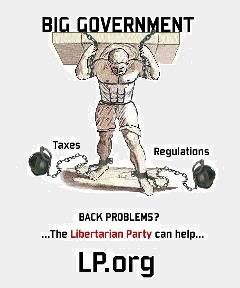Foolish Consistency
Ralph Waldo Emerson once said:
Principles the libertarian purists recognize:
1. The non-initiation of force
2. All taxation is theft and is consequently wrong
3. Unfettered open immigration
Principles I believe should fall under the LP’s slogan:
1. Limited government
- A reduction in the size and scope of government at all levels, incrementally.
- Strongly advocate the benefits and necessity of a pluralistic society.
2. Non-interventionist foreign policy
3. Relatively open immigration but with some sort of border control – Read Badnarik’s position on this.
The first set listed constitutes a world of black and white. It is a foolish consistency as Emerson puts it. One can simply be consistently in favor of maximizing both personal and economic liberties and still be considered principled in the libertarian movement. The pressure that has been exerted on newcomers in the past (and present) to adhere to a very narrow set of principles, especially those that seem to be more in line with those of an anarchist…have only had the effect of keeping this party on the fringe.
Read Lew Rockwell's attempt here at what amounts to basically a "rallying of the troops", for the sake of preserving the reputation the LP currently holds. Tim West pulls out some quotables from his piece here and Thomas Knapp takes his article to task with some criticisms of his own.
A foolish consistency is the hobgoblin of little minds, adored by little statesmen and philosophers and divines. With consistency a great soul has simply nothing to do. He may as well concern himself with his shadow on the wall. Speak what you think now in hard words, and to-morrow speak what to-morrow thinks in hard words again, though it contradict every thing you said to-day. — 'Ah, so you shall be sure to be misunderstood.' — Is it so bad, then, to be misunderstood? Pythagoras was misunderstood, and Socrates, and Jesus, and Luther, and Copernicus, and Galileo, and Newton, and every pure and wise spirit that ever took flesh. To be great is to be misunderstood. ("Self-Reliance", 1841)"The Party of Principle"…the Libertarian Party's own small and simple tagline. Concise, appealing, AND...ambiguous. Yes, I know...it's a slogan and not meant to express anything in detail. But when asking a libertarian (and there are many different flavors) to specifically list and define those principles, I believe you'd get a whole host of different responses. So let me briefly spell out some of the major ones for clarification.
Principles the libertarian purists recognize:
1. The non-initiation of force
2. All taxation is theft and is consequently wrong
3. Unfettered open immigration
Principles I believe should fall under the LP’s slogan:
1. Limited government
- A reduction in the size and scope of government at all levels, incrementally.
- Strongly advocate the benefits and necessity of a pluralistic society.
2. Non-interventionist foreign policy
3. Relatively open immigration but with some sort of border control – Read Badnarik’s position on this.
The first set listed constitutes a world of black and white. It is a foolish consistency as Emerson puts it. One can simply be consistently in favor of maximizing both personal and economic liberties and still be considered principled in the libertarian movement. The pressure that has been exerted on newcomers in the past (and present) to adhere to a very narrow set of principles, especially those that seem to be more in line with those of an anarchist…have only had the effect of keeping this party on the fringe.
Read Lew Rockwell's attempt here at what amounts to basically a "rallying of the troops", for the sake of preserving the reputation the LP currently holds. Tim West pulls out some quotables from his piece here and Thomas Knapp takes his article to task with some criticisms of his own.



4 Comments:
What about the principal that the government should operate within the limits imposed by the Constitution? Can that not be the "principal" that we are all in favor of and willing to work towards?
By Anonymous, at 11:17 PM, July 12, 2005
Anonymous, at 11:17 PM, July 12, 2005
I think that certainly is the most compelling and unifying element to which all stripes of libertarians can ascribe to. That’s why I believe Badnarik was so appealing to the different camps. But we should also note in our rhetoric that the Constitution isn’t perfect. We should at least pay lip service to the fact that it can be amended, in addition to why the process to amend it was made so difficult. This is just as important as defending it in my eyes.
I believe the 14th amendment is one we should take issue with. Badnarik addresses his contempt for it in the Cornell University Presidential Debate (http://www.badnarik.org/Multimedia/debates/cornell_debate_cspan_broadband.asf). The 14th amendment in essence gives corporations “personhood”. I found a small article on it here (http://www.iiipublishing.com/afd/pa-resol.htm) that summarizes the problem fairly well. This is an issue Tim West has stressed time and again…one that the LP can take and run with, and still be considered principled . We can’t give corporations that receive special treatment from government a free pass. I think we could also gain a lot of insight on what we can do from Randy Barnett’s book, Restoring the Lost Constitution (http://www.cato.org/special/restoring_constitution/). I bought it a while back but got pulled away from it due to time constraints (i.e. – looking for a job). I’m going to read it soon enough though…it’s collecting dust right now, sheee-it!
By Rob D., at 9:10 AM, July 13, 2005
Rob D., at 9:10 AM, July 13, 2005
its not that all taxation is theft, its limited taxation and whom is doing the taxing. Libertarian ideals do no go against a local or state tax but against a federal tax required to fund illegal appropriations by the federal government.
By Anonymous, at 10:55 AM, July 15, 2005
Anonymous, at 10:55 AM, July 15, 2005
"Libertarian ideals do no go against a local or state tax but against a federal tax required to fund illegal appropriations by the federal government."
I would agree with your comment, but I would add that if that is the true ideal of the party with regard to tax policy...they need to make it more clear to its constituency. Perhaps another position paper is called for?
It just irks me to see people on the blog and elsewhere proclaim "All taxation = theft", and then offer no credible solution to the matter. It's one thing to be against something, it's another to propose viable solutions. Hence all the resistance to the Exit strategy. And I understand why. There's a tendency in our party to react philosophically to an issue, and then just stop.
Think tanks and political parties should be kept seperate, but I don't think their intentions and proposals need to necessarily have the same amount of distance. We need to tap into the wealth of resources at places like Cato.org and use it to our advantage.
Chris Edwards put out a policy paper on tax policy recently.
"Options for Tax Reform"
http://www.cato.org/pub_display.php?pub_id=3681
"This study looks at possible changes to address those problems. It identifies three goals for tax reform: simplification, efficiency, and limited government. The latter goal focuses on tax code features such as visibility and equal treatment that cultivate an understanding of the high cost of government."
Cato's "Budget & Tax Policy" section here:
http://www.cato.org/fiscal/tax-policy.html
By Rob D., at 9:43 PM, July 15, 2005
Rob D., at 9:43 PM, July 15, 2005
Post a Comment
<< Home